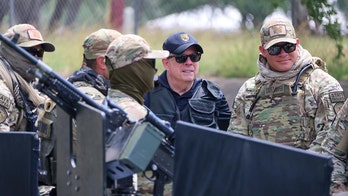The Justice Department set the stage Monday to sue Florida over its effort to purge the voter rolls of non-U.S. citizens -- just hours after Gov. Rick Scott announced that his administration was filing suit against the federal government in connection with the same initiative.
Both moves marked the latest in a volley of accusations and legal maneuvers between Florida and the federal government over the state's controversial effort to check the citizenship of voters.
Florida's suit was filed against the Department of Homeland Security. The state claimed Monday that the federal government was denying access to a database that would allow it to verify the citizenship of registered voters.
But later in the day, a five-page letter was released from the Justice Department warning Florida Secretary of State Ken Detzner that it has "authorized the initiation of an enforcement action against Florida in federal court" over the purging of voter registration rolls. That means the department is going to start taking the steps to sue Florida.
The letter from Assistant Attorney General Tom Perez said, "it appears that the State of Florida is unwilling to conform its behavior to the requirements of federal law."
The Justice Department earlier this month told the state to suspend the effort, claiming Florida was violating federal laws in its effort to find and remove ineligible voters -- and teeing up Monday's letter.
But Scott's administration said Monday that it is the federal government that is skirting the law -- by denying Florida access to its database.
"For nearly a year, the U.S. Department of Homeland Security has failed to meet its legal obligation to provide us the information necessary to identify and remove ineligible voters from Florida's voter rolls," Detzner said in a statement. "We can't let the federal government delay our efforts to uphold the integrity of Florida elections any longer."
In an interview with Fox News on Monday, Scott also defended the initiative. He denied that the purge could unfairly target Latino residents, and he said he's just trying to fairly enforce the law.
"We need to have fair elections in our state. I want to make sure that when we have elections ... not one person's vote gets diluted by somebody that doesn't have the right to vote," Scott told Fox News. "We're doing the right thing. ... We have people that are voting illegally in our races -- that's not right."
Florida last year began looking for non-U.S. citizens on the voter rolls. A comparison of driver's license records with voter registration records turned up as many as 182,000 registered voters who may not be U.S. citizens.
State officials have been seeking access to a federal immigration database to verify the matches. That request has been turned down by the Department of Homeland Security, though so far the state has given a smaller list of more than 2,600 names to local election supervisors.
But that list has come under fire for errors. Supervisors have loudly questioned the accuracy of the list, with one GOP supervisor going on Twitter to show the picture of a U.S. passport of one voter found on the list. Two Democratic members of Congress also recently held a news conference with a World War II veteran whose citizenship had been questioned.
The Associated Press contributed to this report.





